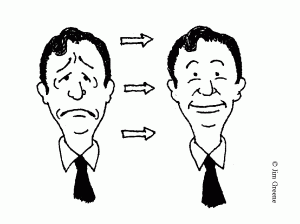Fail Often to Succeed Sooner
By Daniel Robin
“The Mistakes are all there, waiting to be made.”
– S. A. Tartakower, Russian Chess Master, before a game
This is the first installment of a multi-part series on dynamic leadership at work – each article brings you powerful strategies for leading change, reaching toward peak performance, building a better workplace. Join me now as we spy on Bob, the division director at Bogus Corp, whose mistakes speak louder than words:
“This can’t be happening! We asked you guys for a proposal two weeks ago, and you act like it’s no big deal. Am I supposed to do all your work for you?”
“Bob, back off, you’ll get your proposal; you just didn’t say when you wanted it. We’re not in the business of reading minds, you know.”
From Mistakes to Mastery
If you’re lucky, and especially if you consider yourself a “lifelong learner,” your mistakes could be an endless source of inspiration and growth. I’ll bet that jazz music, perhaps the only original American art form, originally sounded to audiences like a series of mistakes. People probably figured the “crazy notes” (improvisation) were because the players didn’t know the right notes. “That’s jazz …,” says local bassist Tunde, “take what comes out and keep goin’.” Because when it comes to the art of leadership, there are no “right notes.”
In music and in business, this spirit of innovation and creativity is what ultimately defines us, makes each of us unique, and can be the fuel for self-expression and mastery. Similar to jazz, our mistakes are arguably the one thing we can truly call our own.
Fortunately, we tend to learn more and better from getting an “unexpected result” than if everything worked out just like we planned. As the saying goes, “If it doesn’t kill you, it’ll make you stronger.” (On the other hand, for the sad-but-darkly humorous side of this topic, see the “Darwin Awards“.)
Lean and agile development strategies are gaining popularity, adapted from Lean Manufacturing (made famous by Toyota), where learning is highly prized, realized through testing a falsifiable hypothesis (theory). If you can’t prove it wrong, there’s no point in testing it! It turns out, experimental design mistakes are very easy to make.
From Potential to Performance
Philosophically, how do you feel about the mistakes you make? I’m not talking about the ones you’ve already made – that’s history, and if you’ve got any unfinished business in that department, may I suggest you find a way to get complete about it (hint: forgiveness is defined as “letting go of all hope for a better past”).
But how about the mistakes you are yet to make – or currently are making?
Mistaken Assumptions
A prominent myth in business is that mistakes are bad, spell out failure, lead to career cul de sacs. This myth stems from the assumptions of the “old school” of management where people are expected to follow orders, to be mere factors of production, without human shortcomings. If your achievement record is otherwise strong, a graceful, non-defensive recovery from being “human” can become the trump card to demonstrate how you deal with adversity and how resilient you are.
Ideally, mistakes are the fast-track to learning and breakthrough innovation. At companies that walk the talk of “continuous quality improvement,” for example, mistakes are often seen as valuable and hopefully affordable teachers. Some adopt the belief that there are no “mistakes” per se, there are only results; or there is no “failure,” there’s only feedback…. (see our website for details). And while most “intelligent” mistakes are useful, others – due to carelessness, improper planning, or making decisions while emotionally hijacked – are just inconvenient or needlessly inefficient.
Make No Mistake: Leadership has a Creative Edge
We can define creativity as “disturbing the present reality” – even if that reality gets worse, temporarily. Taking an active leadership role where some mistakes are expected will position you and your colleagues to learn at an accelerated pace. This priority on learning and becoming a “learning organization” builds a lasting competitive advantage. So go out and make some high-quality mistakes!


